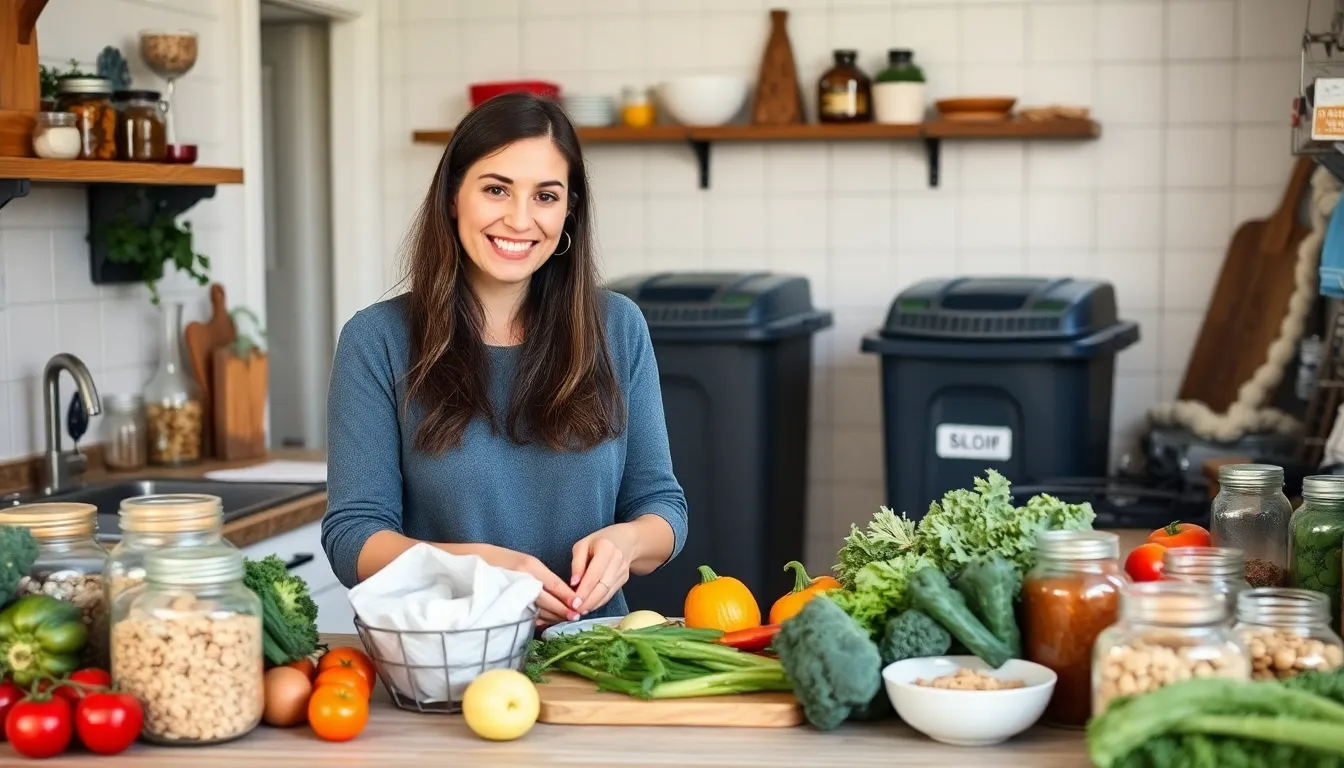Imagine whipping up a delicious meal while saving the planet—sounds like a superhero move, right? Welcome to the world of zero-waste meals, where every carrot top and stale bread crumb finds a purpose. Not only does this culinary trend help reduce food waste, but it also turns cooking into a creative adventure. Who knew that yesterday’s leftovers could become today’s gourmet masterpiece?
Understanding Zero-Waste Meals
Zero-waste meals focus on using every part of ingredients to minimize waste. This approach allows for creativity in cooking and fosters a sustainable kitchen environment.
Definition and Importance
Zero-waste meals refer to dishes created with the intention of utilizing all edible parts of ingredients, minimizing disposal. This culinary trend addresses food waste, as it transforms perceived scraps into valuable components of a meal. The importance of zero-waste meals lies in their potential to contribute to environmental sustainability. By reducing waste, individuals play a role in conserving resources and lowering carbon footprints.
Benefits of Zero-Waste Meals
Zero-waste meals provide numerous benefits. First, they maximize ingredient utilization, allowing for cost savings in grocery bills. Second, these meals inspire creativity, encouraging cooks to experiment with new flavors and textures. Environmental impact also improves, as reduced waste leads to lower landfill contributions. Additionally, health benefits arise from using fresh, whole ingredients, which can enhance nutritional intake. Overall, embracing zero-waste meals promotes a more sustainable and innovative cooking practice.
Planning Your Zero-Waste Meals

Planning zero-waste meals involves creative strategies that utilize all food parts and mindful ingredient choices. This approach maximizes resources and minimizes waste.
Meal Preparation Strategies
Optimizing meal preparation reduces food waste significantly. Start by creating a comprehensive meal plan, incorporating every ingredient thoroughly. Use leftovers creatively by repurposing them into new dishes. For instance, turn vegetable scraps into broths or make croutons from stale bread. Organizing meals by themes, such as “Meatless Mondays,” helps to utilize ingredients effectively. Batch cooking allows for better use of bulk ingredients, ensuring nothing goes to waste. In addition, flexibly adapting recipes based on available ingredients promotes a zero-waste approach.
Ingredient Sourcing Tips
Sourcing ingredients with zero waste in mind enhances sustainability. Seek local farmers’ markets for fresh produce, as these often sell imperfect items. Shopping in bulk helps minimize packaging waste and encourages purchasing just what’s necessary. Consider growing herbs and vegetables at home to reduce reliance on store-bought items. Prioritize seasonal ingredients, which require fewer resources and have a lower carbon footprint. Connecting with local community gardens can provide access to surplus produce, fostering community assistance and further reducing waste.
Creative Recipes for Zero-Waste Meals
Cooking creatively with scraps not only minimizes waste but also enhances flavor. Here are some innovative zero-waste meal ideas that maximize ingredient use.
Breakfast Ideas
Include vegetable scraps in breakfast dishes. Chopping carrot tops or beet greens elevates omelets or frittatas. Utilize stale bread for a satisfying French toast or bread pudding. Combine banana peels with smoothies for extra nutrients. Cooking with aquafaba, the liquid from canned chickpeas, transforms pancake recipes. Making overnight oats with fruit scraps, like apple cores, infuses natural sweetness.
Lunch and Dinner Options
Incorporate all vegetable parts into stews or stir-fries. Potato peels can add texture when sautéed. Use broccoli stalks by chopping them into salads or slaw. Merge leftover grains with beans for a nutritious salad or bowl. Repurpose vegetable scraps into homemade stock for soups. Integrating citrus peels in marinades infuses zest into meats or tofu dishes. These methods create meals while significantly reducing food waste.
Impact of Zero-Waste Meals
Zero-waste meals play a crucial role in promoting sustainability and enhancing community engagement. Creating meals from all parts of ingredients significantly impacts the environment and the economy.
Environmental Benefits
Reducing food waste leads to lesser greenhouse gas emissions. Landfills are a major source of methane, a potent greenhouse gas, produced when food decomposes. By embracing zero-waste meals, individuals actively minimize their carbon footprint. Conservation of natural resources becomes achievable when every food part gets utilized. Water, energy, and labor are conserved, contributing to a healthier planet. Adopting this approach also encourages biodiversity through the use of seasonal, local ingredients, supporting sustainable farming practices.
Economic Advantages
Saving money happens as zero-waste meals reduce overall food expenses. Utilizing every part of ingredients ensures less money spent on purchasing new items. Meal planning and creative uses for leftover scraps avoid frequent shopping trips, leading to better budgeting. Additionally, nutritional quality improves as fresh and whole ingredients are prioritized. Investing in local markets often results in lower food costs and better flavors. Increased culinary creativity not only enhances meals but also extends the value of existing food supplies, resulting in more savings.
Zero-waste meals represent a transformative approach to cooking that champions creativity and sustainability. By embracing this method, individuals can not only reduce their environmental footprint but also discover new culinary possibilities. The practice of utilizing every part of ingredients fosters a deeper connection to food while promoting mindful consumption.
As more people adopt zero-waste principles, the collective impact on reducing food waste and supporting local economies becomes significant. This shift not only enhances meal experiences but also contributes to a healthier planet. By continuing to explore and innovate in the kitchen, everyone can play a role in creating a more sustainable future through delicious, resourceful meals.